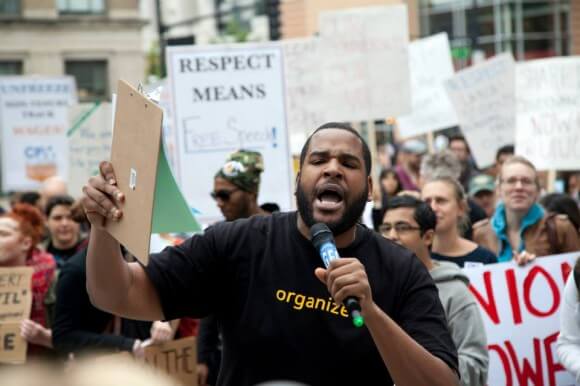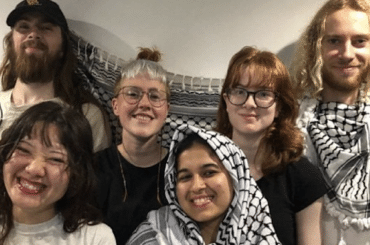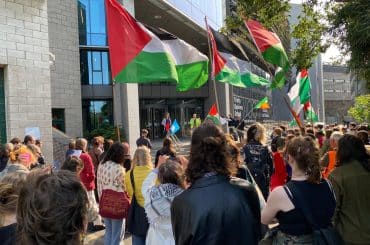At around 12:15 p.m. last Thursday word began circulating around the University of Illinois Urbana-Champaign (UIUC) Campus that Arab-American scholar Steven Salaita’s appointment to the faculty had been voted down by the Board of Trustees.
Salaita, a distinguished scholar of six books, was fired by the University Chancellor two weeks before his appointment at UIUC was to begin because of pro-Israel and donor complaints about his tweets criticizing Israel’s massacre in Gaza.
But the scene at the reception of this news was anything but defeatist.
At the Alma Mater statue on campus, more than 250 people had gathered in protest against the University Administration, a many-headed hydra of UIUC’s angry, enraged and dispossessed.
They included members of the University’s AFSCME unit who were in the middle of a hard-fought contract negotiation with the administration.
They included members of the Campus Faculty Association, as well as the AFT/IFT/AAUP local 6546 of Non-Tenure Track Faculty, who had been hit with a “wage freeze” by the administration.
They included members of the University of Illinois Chicago faculty union who had driven 90 miles to show solidarity with their brothers and sisters at UIUC.
And they included a wide layer of students and faculty representing both the Graduate Employees Organization on campus, Students for Salaita, a support group, and an ad hoc faculty collective led by among others Robert Warrior, the head of American Indian Studies which had recruited and hired Salaita to his position.
As the rally got under way two things became clear:
First, that the University administration had been consistently arrogant across the board, alienating wide swaths of people—especially ones who did the hard work of keeping the campus running. Staff members had been disrespected, faculty members had been denied their say. And now the Board of Trustees—an elite group— who had never taught a class on campus or kept a departmental office functional, got to put their final seal on the hire decision of a preeminent scholar.
Second, that the campus had figured out a way to fight these multiple crimes of their administrators. They had put in organizing practice the old slogan: an injury to one is an injury to all.

As we stood there listening to speaker after speaker connect the threads between Salaita’s firing, Apartheid Israel and the violation of labor rights at home—we realized that these people at UIUC was showing us something important: they were showing us the way to a new social movement that could constitute a fighting force against neoliberalism, both at home and abroad.
So here are five lessons we learnt from our friends and colleagues at UIUC campus that day:
1. A broad Struggle is needed against Neoliberal University Administrators because they Serve Political interests not Academic Ones
The convergence of the Salaita firing and attacks on workers at UIUC had made clear to all that the University administration was in many ways a proxy for an American political elite whose agenda they were defending.
What people were realizing is that the contours of academia were no protection from a political class determined to run roughshod over campus democracy.
As we have argued in Electronic Intifada recently, the decision making process about whether the Arab American scholar Steven Salaita could teach at UIUC, branched out all the way from the Chancellor Phyllis Wise’s office, through Chris Kennedy’s business empire, and on to the Illinois Governor Pat Quinn’s junkets to Israel. As has been documented as well, pro-Israel donors and advocates made clear to the University that they didn’t want Salaita on campus. This is politics, pure and simple.
2. Labor Organizing Cannot be blind to Palestine
Traditionally, US Labor leaders have urged their members to shut their eyes to this panoramic view of US imperial interests and how such interests have affected wages and working conditions at home.
In 2009, newly elected AFL-CIO President, Richard L. Trumka stood before the Jewish Labor Committee to denounce efforts to boycott Israel.
Significantly, Trumka’s attack on the boycott of Israeli apartheid and Occupation echoed charges of anti-semitism that have been used by Steven Salaita’s detractors like the Anti-Defamation League which lobbied UIUC President Robert Easter to fire Salaita.
For someone entrusted with leading the struggle of ordinary people against powerful interests, Trumka most irresponsibly tried to squash all resistance by Palestinian supporters against Israel by equating anti-Zionism with anti-semitism.
Luckily, rank and file union activists have not always followed this path dictated by their leaders.
The longshoremen union, ILWU in Oakland, recently refused to cross a community picket line set up by Palestinian and Occupy activists, an action that stopped an Israeli ship from docking at the port. The ILWU have had a proud history of engaging in similar actions. In 1978 and 1980, ILWU refused to load military cargo headed for Chile and El Salvador. And in 1984, most famously, the union refused to unload a South African ship for eleven days.
3. An Injury to One is always an Injury to All; Palestine is not an exception
This kind of inspiring intersectional solidarity between struggles was on full display at UIUC last Thursday.
For example, Robert Warrior, Chair of American Indian Studies at UIUC, argued for the importance of continuing to connect the struggles of unionized AFSCME workers on campus to the fight for faculty governance and Salaita’s reinstatement.
As speakers mounted their attacks on the University administration, American Federation of Teacher campus organizer, Anne Dietz-LaVoie, outlined for us how solidarity formed the connecting tissue between the various struggles on campus.
The same administration, Ms. Dietz-LaVoie said, that was “disregarding shared governance, squelching academic freedom… or going against their own process to ‘de-hire’ someone based on personal communication rather than scholarly attributes ” was the very same one that was “freezing non-tenure track wages [and] refusing to bargain with them.”
We asked her how the Occupation of Palestine or the question of Israeli Apartheid has affected the labor contract battles on campus.
“I think”, said Dietz-LaVoie, “any time people stand up for what they believe to be a just and right course it does nothing but good. So for us, having people who are linking multiple tough issues together, and saying there is still a common solution you can have, has given us a lot of motivation and energy.”
This creative labor organizer is pointing to an important approach to organizing working people, namely that the working person’s struggle for a better life extends beyond the workplace.
Dietz-LaVoie told us, any good labor organizer knows that organizing workers must not be limited either to the work place alone or between 9 am and 5pm because attacks on the community are part of any working person’s life. So school closing, police shootings, reduced public services due to war spending— are all part of the fabric of workers’ lives. Community organizing and workplace organizing should learn from each other and when the need arises, act in concert.
4. Tearing down Organizational Silos
This idea of a deep and braided struggle was echoed by UIUC Ph.D. student Julie Laut, who told us she planned to put up signs in super markets saying “Steven Salaita can be my neighbor.”
Julie’s idea was a reminder that since the beginning of Operation Protective Edge we have seen emerge new forms of solidarity and public consciousness that has refused to stay in traditional organizational silos.
Who can forget Palestinians tweeting out support for Ferguson residents under siege, or Ferguson residents referring to police seizure as “Occupation” and strolling streets waving Palestinian flags.
The inspiring Ferguson-Palestine example, however, also helps us understand what we are up against. While public consciousness of intersecting oppressions has never been higher, the structures in which people are currently organizing their resistance remain discrete.
We need new social formations and new social movements in which the fight against Islamophobia and racism is seen to be as important and central to the fight for workers’ rights.
We need existing structures that fight injustice, like Richard Trumka’s AFL-CIO, to understand that smashing Zionism and Israeli apartheid are actual building blocks of labor solidarity.
That is why we are heartened by the resolution passed this week by the Trade Union Congress, the national federation of trade unions in England and Wales (roughly equivalent to the AFL-CIO) to “increase the pressure on Israel to end its occupation of all Palestinian territories, the TUC, working in conjunction with the Palestine Solidarity Campaign, is calling for a targeted consumer boycott of goods from the illegal Israel settlements.”
 5. “Our Masters are Joined Together and We Must Do the Same Thing”
5. “Our Masters are Joined Together and We Must Do the Same Thing”
If Steven is not reinstated to his position at the University of Illinois, it will not just be a blow to workers’ rights on campus, a blow to academic freedom, or a blow to the cause of Palestinian struggle. It will be blow to all of them.
As the UIUC campus is showing us, solidarity between our various struggles is not an optional nicety—it is the only specter that can haunt the bosses of our Zionist-Neoliberal University.




UIUC will try to divide these fine people. And to conquer these groups, one by one. That is what power does.
The Salaita matter made blatant and very public what “power” (capitalism, big-money political donors, big-money educational donors, who so openly regard themselves the masters of our society that they don’t trouble to hide their machinations) does and how it does it.
These people are right to seek a broad coalition. Power has become absolute power, and absolute power corrupts absolutely. It’s no joke.
Power, instead, to the people!
“As the UIUC campus is showing us, solidarity between our various struggles is not an optional nicety—it is the only specter that can haunt the bosses of our Zionist-Neoliberal University. – See more at: https://mondoweiss.net/2014/09/struggle-reinstate-university#sthash.pLNgmEef.dpuf”
Jeez. With screeds like this, I can’t imagine why the Salaita affairs failed completely to penetrate any mainstream consciousness.
Maybe you should tell a few more lies about the “Zionist-neoliberal university (whatever the hell that means), and you’ll have more success.
No intelligent discussion of the Salaita case is possible unless it is acknowledged that Salaita has written provably anti-semitic statements. Otherwise all discussion goes forward on false premises..
Never mind the tweets. Here is a collection of evidence from his publications. I am not claiming originality here–just displaying what has been discovered.
In “Israel’s Dead Soul” (his book in 2011) in the chapter on the Anti-Defamation League, Salaita wrote that “It is worth noting that numerous cases of antisemitic valdalism in 2007 and 2008 were found to actually have been committed by Jews” (p. 45).
A very serious accusation, no? (and he’s not talking about israelis, or the israeli govt–he’s talking about JEWS.)
There were about 630 cases of antisemitism reported in 2007 and 2008. Salaita cites a total of four. First of all–is that “numerous”?
But second, in two of those four cases in the footnotes (pp. 146-147), Salaita INVENTS nefarious sneaky Jews. In one case, a girl had carved a swastika into her own leg. But the BBC report which Salaita cites says she was a German (and the incident had nothing to do with Jews at all). [The recent Tablet article said that the ethnicity of the girl wasn’t mentioned on the BBC; this is incorrect.] Salaita here simply invented a sneaky nefarious Jew.
A second case is Ivan Ivanov. Salaita describes it this way: Ivanov, “a Bulgarian Jew in Brooklyn was arrested in January 2008, for numerous instances of spray painting anti-Semitic graffiti on houses, vehicles, and synagogues. The New York Times reported that Ivanov was trained by the Mossad.”
In fact, what the Times reported was that Ivanov told police that he was ITALIAN by birth, raised in Bulgaria and CLAIMED to have been trained by the Mossad. Here, too, Salaita had created a sneaky nefarious Jew –this time by falsifying a Times story in order to use the prestige of the Times to support his general thesis of Jews concocting antisemitic incidents– as if the Times had reported as a fact that Ivanov had been trained by Mossad. In fact, what the Times reported was merely the likely delusional account of a troubled man.
Inventing false nefarious Jews in order to support a general accusation against Jews–that’s Exhibit A of antisemitism.
And we also now have a candidate for a position who has falsified data in order to “prove” his general thesis. (Of course the thesis itself–that Jews invent numerous antisemitic incidents–is itselt antisemitic.) You want him training your graduate students in the use of sources?
And then there’s THIS, first pointed out by Martin Kramer:
Salaita in “Israel’s Dead Soul”, writes the following: “It is well known by Palestinians that anytime one of them enters or exits Israel, regardless of nationality, he or she will likely undergo an anal or vaginal probe. These probes… aren’t intended to be pragmatic. They are acts of psychological domineering and political assertion.”
This accusation is (a) sheer invention. And (b) the sexual imagery is traditional antisemitism: right out of Der Sturmer or “Jude Suss.”
Those who read Salaita’s tweets became worried. They were right. The antisemitic statements here form the *context* of the over-the-top tweets
As has been documented as well, pro-Israel donors
I noticed how this article mentions the term Israel, and now is as good a time as any to mention this: I propose using the term “pro-Israeli” instead of “pro-Israel”, and using “Israeli” or “Israeli State” instead of “Israel”.
First, we say pro-Amrican, pro-Russian and “pro-Canadian donors”, not “pro-American donors”. Grammatically, pro-Israeli is a more correct as an adjective than using the noun, “Israel”.
Second, but perhaps more importantly, there is a common confusion between people uninformed about the issue between the ancient, Biblical, Israel having a full, direct relationship with God’s presence in the Temple, and the modern Israeli state.
I myself had this confusion until I was about college aged and learned what Christian and Muslim villages were going through, which made me learn more about the topic. In my mind, the two societies were practically the same, and so it made me think of the modern state in semi-Biblical terms, even though my Christianity was not Fundamentalist. This had a major impact on my thinking about a conflict that I did not know much about. Based on surveys, many other mainstream and conservative American Protestants have the same tendency, and this is a major factor in the conflict, although perhaps often an unacknowledged one
In case you haven’t realized it by now, the Israeli state can at most only represent part of the “People of Israel”, for at least two reasons. First, very many Palestinians are in fact ethnically part of the ancient People of Israel, yet Israeli society rejects them. Second, Israeli society defines the People as excluding converts to other faiths, despite Halakha’s inclusion of those converts as part of the People. Third, that conversion of those ethnic Israelites (ie. Palestinians) to Islam should not have excluded them from belonging to the People of Israel, because they still believe in the same God.
Thus, the correct adjective is “pro-Israeli”, while the name “Israel” leads to a religious confusion with the broad, ancient People of Israel. People who wish to make a more objective approach should use the term “Israeli” to avoid confusion.
Definitely creepy junk:
“The Amcha Initiative, the Zionist organization that has repeatedly intimidated, spied on and harassed students and faculty, appears to be escalating its campaign by publishing what amounts to a target list of “anti-Israel” professors.
Amcha says that the list is made up of “218 professors identifying themselves as Middle East scholars, who recently called for the academic boycott of Israel in a petition.””
more here: http://electronicintifada.net/blogs/ali-abunimah/zionist-group-publishes-target-list-anti-israel-us-professors